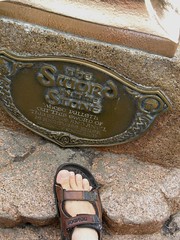 |
| Comic on the quality of different methods of peer review (Photo credit: Wikipedia) |
One thing that I should have blogged about happened last Saturday. I usually have to work on Saturdays, but I put in 38 hours last week, so I couldn't have any more hours (if I hit 40, they'd have to give me benefits, etc.). I worked on school stuff for a few hours, and then I decided to watch Star Wars: The Force Awakens again. I needed to settle on the scenes I'm going to use in the research paper. I'll talk more about this in my next post.










